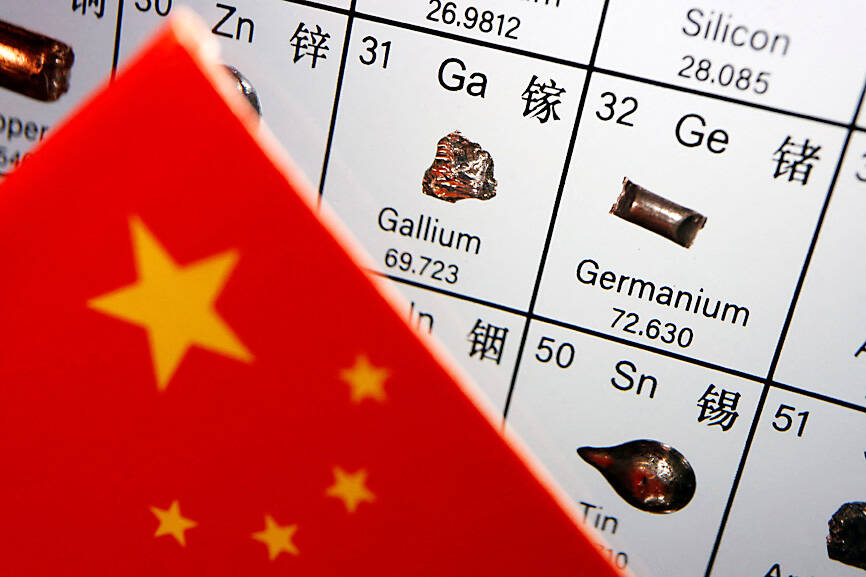China yesterday said it would restrict exports to the US of some key components in making semiconductors, after Washington announced curbs targeting Beijing’s ability to make advanced chips.
Among the materials banned from export are metals gallium, antimony and germanium, Chinese Ministry of Commerce said in a statement that cited “national security” concerns.
Exports of graphite would also be subject to “stricter reviews of end-users and end-uses,” it said.

Photo: Reuters
“To safeguard national security interests and fulfill international obligations such as non-proliferation, China has decided to strengthen export controls on relevant dual-use items to the United States,” Beijing said.
“Any organization or individual in any country or region violating the relevant regulations will be held accountable according to the law,” it added.
China accounts for 94 percent of the world’s production of gallium — used in integrated circuits, LEDs and photovoltaic panels — according to a report by the EU published this year.
For germanium, essential for fiber optics and infrared, China makes up 83 percent of production.
In its own latest curbs, Washington on Monday announced restrictions on sales to 140 companies, including Chinese chip firms Piotech Inc (拓荊科技) and SiCarrier Technologies Co (新凱來), without additional permission.
They also impact Naura Technology Group Co (北方華創), which makes chip production equipment, the US Department of Commerce said.
The move expands Washington’s efforts to curb exports of state-of-the-art chips to China, which can be used in advanced weapons systems and artificial intelligence.
The new US rules also include controls on two dozen types of chipmaking equipment and three kinds of software tools for developing or producing semiconductors.
Separately, Dutch tech giant ASML Holding NV, which supplies chipmaking machines for the semiconductor industry, brushed off the announcement of fresh US export curbs to China, keeping its forecasts unchanged.
“For 2024, we do not expect any direct material impact on our business,” the firm said in a statement late on Monday.
“For 2025, we expect that the impact will fall within what was communicated at the time of our Q3 [third quarter] 2024 earnings,” it added.
The firm projected total net sales for next year of 30 billion to 35 billion euros (US$31,56 billion to US$36.82 billion), with sales from China making up about one-fifth of that.
Over the longer term, the new curbs did not impact its predictions for the health of the industry as a whole, ASML said.
“We therefore also confirm potential 2030 scenarios for annual total net sales between approximately 44 billion and 60 billion euros,” it said.

Real estate agent and property developer JSL Construction & Development Co (愛山林) led the average compensation rankings among companies listed on the Taiwan Stock Exchange (TWSE) last year, while contract chipmaker Taiwan Semiconductor Manufacturing Co (TSMC, 台積電) finished 14th. JSL Construction paid its employees total average compensation of NT$4.78 million (US$159,701), down 13.5 percent from a year earlier, but still ahead of the most profitable listed tech giants, including TSMC, TWSE data showed. Last year, the average compensation (which includes salary, overtime, bonuses and allowances) paid by TSMC rose 21.6 percent to reach about NT$3.33 million, lifting its ranking by 10 notches

Popular vape brands such as Geek Bar might get more expensive in the US — if you can find them at all. Shipments of vapes from China to the US ground to a near halt last month from a year ago, official data showed, hit by US President Donald Trump’s tariffs and a crackdown on unauthorized e-cigarettes in the world’s biggest market for smoking alternatives. That includes Geek Bar, a brand of flavored vapes that is not authorized to sell in the US, but which had been widely available due to porous import controls. One retailer, who asked not to be named, because

SEASONAL WEAKNESS: The combined revenue of the top 10 foundries fell 5.4%, but rush orders and China’s subsidies partially offset slowing demand Taiwan Semiconductor Manufacturing Co (TSMC, 台積電) further solidified its dominance in the global wafer foundry business in the first quarter of this year, remaining far ahead of its closest rival, Samsung Electronics Co, TrendForce Corp (集邦科技) said yesterday. TSMC posted US$25.52 billion in sales in the January-to-March period, down 5 percent from the previous quarter, but its market share rose from 67.1 percent the previous quarter to 67.6 percent, TrendForce said in a report. While smartphone-related wafer shipments declined in the first quarter due to seasonal factors, solid demand for artificial intelligence (AI) and high-performance computing (HPC) devices and urgent TV-related orders

Prices of gasoline and diesel products at domestic fuel stations are this week to rise NT$0.2 and NT$0.3 per liter respectively, after international crude oil prices increased last week, CPC Corp, Taiwan (台灣中油) and Formosa Petrochemical Corp (台塑石化) said yesterday. International crude oil prices last week snapped a two-week losing streak as the geopolitical situation between Russia and Ukraine turned increasingly tense, CPC said in a statement. News that some oil production facilities in Alberta, Canada, were shut down due to wildfires and that US-Iran nuclear talks made no progress also helped push oil prices to a significant weekly gain, Formosa said